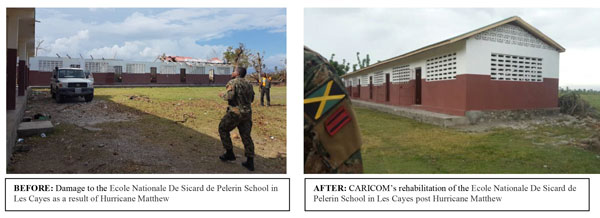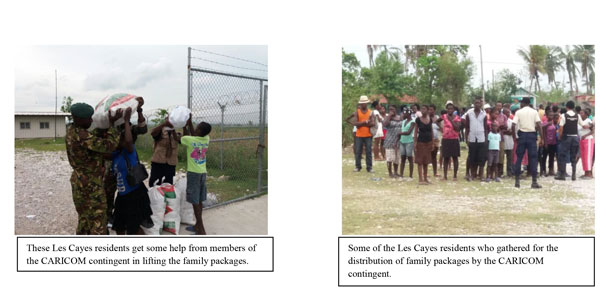The Caribbean Community’s (CARICOM) response to the devastation in Haiti as a result of Hurricane Matthew on October 4, 2016 is deemed a resounding success. CARICOM’s response was led by the Caribbean Disaster Emergency Management Agency (CDEMA) in providing emergency relief supplies and early recovery operations in the two most affected areas of Les Cayes and Jérémie.
As part of a legacy intervention, CARICOM supported the rehabilitation of the Ecole Nationale De Sicard de Pelerin School in Les Cayes and a feeding programme for the students for a period of two weeks. The CARICOM response also provided US$53,000 in relief supplies (including items such as tarpaulin, water, protein, starch, hygiene products and supplies for babies) to 805 families in Les Cayes.
Additionally, the Government of the Commonwealth of Dominica shipped two 20 ft. containers of relief supplies to Haiti and provided cash donations of US$100,000 to support CARICOM efforts. The Government of Jamaica also shipped two 20 ft. containers of relief supplies donated by the people of Jamaica while the Government of the Turks and Caicos Islands provided cash donations of US$50,000 and personnel to also aid the recovery and relief process.
Noting that the relief and early recovery operations in Haiti have come to a close, CDEMA’s Executive Director, Mr. Ronald Jackson said, “The success of the mission would not have been possible if it wasn’t for the personnel, the regional response teams, the contributions made by CDEMA Participating States, regional and international partners, including the United States Southern Command and the World Food Programme (WFP). On behalf of the CDEMA System and the wider Caribbean Community, I wish to recognize and thank them all for their contributions.”
The Executive Director also expressed gratitude to Digicel Business (Barbados) for demonstrating their support by offsetting the costs for calls and data usage incurred by CDEMA’s staff during the response period.
“The efforts spearheaded by CDEMA underscore the importance and urgency in which the region needs to continue to strengthen its capacity. We need to identify sustainable mechanisms to finance these systems so we can continue to serve the needs of our Participating States in a predictable way,” added Mr. Jackson.
The region’s response started with the deployment of the CARICOM Operational Support Team (COST) between October 7 and 19, 2016 at the request of the Government of Haiti. The COST provided direct support to the Emergency Operation Centres of Les Cayes and Jérémie by compiling data, generating information, coordinating both external and internal resources, as well as generating reports. The team was led by CDEMA and supported by technical personnel from Barbados, Jamaica, Montserrat, Saint Lucia, Trinidad and Tobago, Turks and Caicos Islands and the Caribbean Media Corporation (CMC).
Highlighting the valiant efforts and contributions to the early recovery process by the local Haitian officials, retired Brigadier General Earl Arthurs, CDEMA’s Operations Specialist and Special Coordinator on the ground in Haiti, said, “I think one of the major achievements of the mission was the show of ownership and leadership by the Haitian Directorate of Civil Protection (DPC) of the response operations at the national and departmental levels.”
General Arthurs, who was stationed in Haiti with the COST for four weeks, also stressed the high level of participation of all the relevant sectors in meetings. He also commended the high standard of the Situation Reports produced and circulated by the DPC Haiti throughout the period.
In addition to the COST, a CARICOM Disaster Relief Unit (CDRU) team was deployed to assist with the distribution and management of relief supplies. Deployment of the CDRU and the Jamaica Defence Force (JDF) personnel was facilitated by the Regional Security System (RSS) and the Government of Jamaica. The CDRU also assisted with establishing high frequency radio communication between Jérémie and Les Cayes.
The rehabilitation of the school was facilitated by Structural Engineer, Grenville Phillips, who donated his time to provide supervision and on-site training to Haitian artisans. Military engineers from the JDF also facilitated the repairs to the school in Les Cayes as well as provide military security for the CARICOM humanitarian actors on the ground, including members of the CDRU and COST. All teams that were deployed to Haiti were redeployed by November 16, 2016 signaling the end of the operations.
Hurricane Matthew, the fifth named hurricane of the 2016 Atlantic Hurricane season, was formed near the Windward Islands on September 28, 2016. Hurricane Matthew subsequently impacted Haiti on October 4, 2016. Matthew provided significant impact to Haiti as a powerful Category 4 hurricane on the Saffir-Simpson Hurricane Wind Scale with maximum sustained winds up to 140 mph (220 km/h) with higher gusts.
Daily weather analysis and briefings were provided by the Caribbean Institute for Meteorology and Hydrology (CIMH) in supporting the preparedness and response teams in Haiti to inform operations. The Government of Haiti reported that Hurricane Matthew resulted in 546 deaths, with another 1,410,774 people being in urgent need of humanitarian assistance at the height of the emergency and 120,000 families having their homes destroyed or damaged.













![.[L-R] Parliamentary Representative for Castries Southeast, Lisa Jawahir & Talk show host, Timothy Poleon](https://thevoiceslu.com/wp-content/uploads/2026/02/Lisa-Jawahir-Timothy-Poleon-380x250.jpg)
![Public Service and Utilities Minister Stephenson King delivered remarks [Photo credit: VP]](https://thevoiceslu.com/wp-content/uploads/2026/02/Stephenson-King-380x250.jpg)

